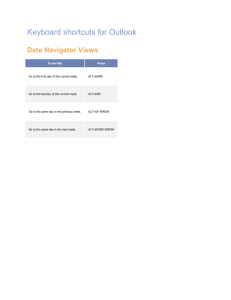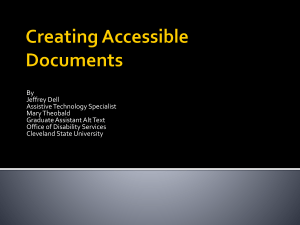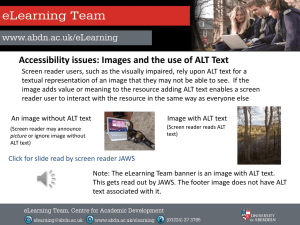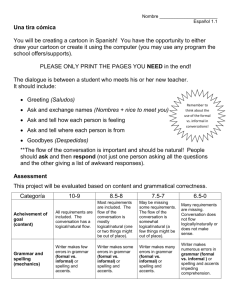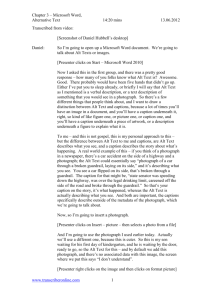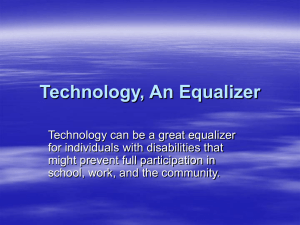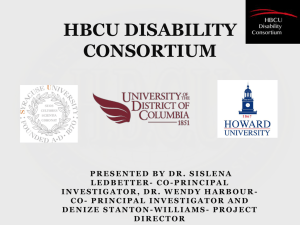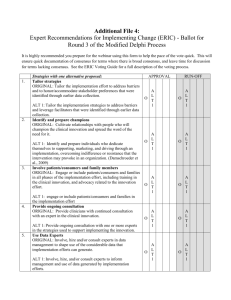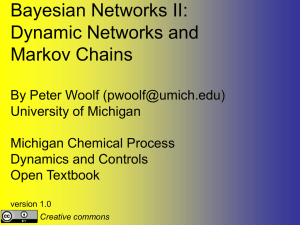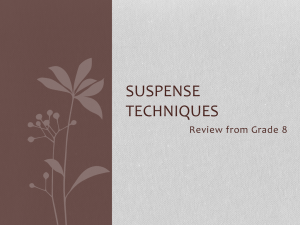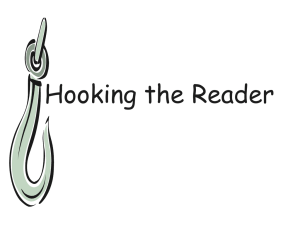are not
advertisement
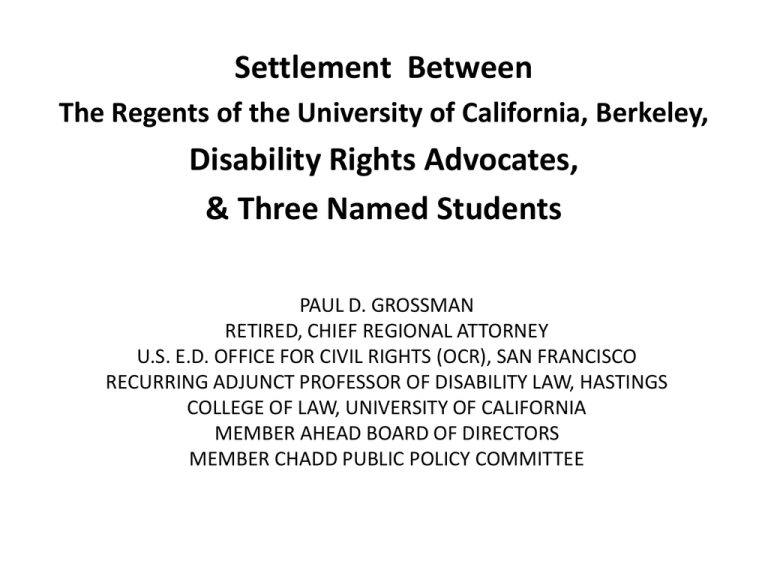
Settlement Between The Regents of the University of California, Berkeley, Disability Rights Advocates, & Three Named Students PAUL D. GROSSMAN RETIRED, CHIEF REGIONAL ATTORNEY U.S. E.D. OFFICE FOR CIVIL RIGHTS (OCR), SAN FRANCISCO RECURRING ADJUNCT PROFESSOR OF DISABILITY LAW, HASTINGS COLLEGE OF LAW, UNIVERSITY OF CALIFORNIA MEMBER AHEAD BOARD OF DIRECTORS MEMBER CHADD PUBLIC POLICY COMMITTEE Caveat These materials are provided for informational purposes only and are not to be construed as legal advice. You should seek independent counsel to resolve the individualized legal issues that you are responsible for addressing. Further, any policy or procedure additions or revisions should be reviewed by your college’s legal counsel prior to implementation. 2 USE AND PERMISSIONS This material has been provided for your personal use. Any duplication or distribution requires the written consent of Paul D. Grossman Paul Grossman • Paul D. Grossman, JD – University of Wisconsin, Madison (JDS); Oxford University, England (Philosophy of Law) – Admitted to the Wisconsin and California Bars – Chief Regional Attorney, US ED OCR, San Francisco, Retired 2013 – Adjunct Professor Hastings College of Law, University of California (1995-present) • Paulgrossman@comcast.net Paul Grossman • Awarded Blosser, Lanterman and Presidential honors by AHEAD and CAPED • Publications Pending: – Colker and Grossman, THE LAW OF DISABILITY DISCRIMINATION, 8TH EDITION. Lexis-Nexis, Textbook, teacher’s guide, and handbook (November 2013) – Paul Grossman, THE GREATEST CHANGE IN DISABILITY LAW IN TWENTY YEARS: WHAT YOU NEED TO KNOW. National Association of Student Personnel Administrators (NASPA) (Chapter 1, October 2013) Other Pertinent Publications • Journal of Post-Secondary Education and Disability, “The Perfect Storm” (2009) • Academe, MAKING ACCOMMODATIONS: The Legal World of Students with Disabilities (2001) Settlement Between UCB, DRA and Three Students Basic Provisions • With proper student notice, 90% of time required reading books converted within 10 days • With proper student notice, 90% of time required reading readers converted within 17 days Basic Provisions • Personal readers provided when delays or for unconvertible material such as rare books • The University will regularly instruct students with print disabilities in alt media request procedures and timelines, in the use of alt media self-help options – The webpage http://dsp.berkeley.edu/timelines.html of the University’s Disabled Students Program (“DSP”) will be amended to make clear that timeframes applicable to alternative media are governed by the Alternative Media Guidelines • On an annual basis the University will appropriately educate staff and administrators Basic Provisions • Faculty must put in reading lists 7 weeks before the start of the semester • Faculty may be sanctioned for a failure to timely submit their lists • Assistive technology packages distributed around campus Submission of Requests by Students • DSP will provide assistance to students who request help in filling out alternative media requests • Reminders if list of materials not received from the student • Major library provisions: – The University has created and implemented a new Library print conversion system to enable students with print disabilities to request that a specific library book or journal be converted into an accessible digital format, with an average turnaround time of five business days – Remedy existing barriers in online library catalogue system so that students can access that system using their screen reader software programs Notice by Students • The University may ask the student to verify that the requested material was assigned or recommended by the instructor • The Disabled Students Program will require verification of purchase only for instructional materials which nondisabled students are routinely expected to purchase and hardcopies of books will be returned in three days • In the event self-help options are not sufficient, UCB will arrange for a reasonable extension of a course deadline, personal reader, a copy of an unedited version of the student’s alternative media, or other appropriate interim accommodation Production Resources • Alt media staff will identify and continually update relevant online databases • The University will maintain staffing at an adequate level to ensure students are able to access the appropriate alternative media for their needs on a timely basis • Designate an Alt Media Assistant position whose primary role will be facilitating quick response and problem-solving Tracking • The University will maintain an online alternative media request/response tracking system about the status of alt media requests, indicating date of request receipt and scheduled standard production time due date for completion (based on the Alt Media Guidelines timeframes). • The student will be sent an email acknowledging receipt of the alt media request and stating the scheduled completion date. • If the original estimated date of completion must be adjusted … the student will be sent an email with the new estimated date of completion. Self-Help Options • Not required, but encouraged • Make available to students a variety of scanning machines to allow students to self-scan materials into a variety of accessible digital formats. • Provide assistance to students with physical disabilities that preclude them from using self-scanning machines independently. • Students encouraged to check on-line data bases • If students sends production file it will be printed out • Students will be provided an alt. media guide Faculty Incentives to Cooperate • “Course instructors may be subject to referral to the Vice Provost for Faculty if they refuse to submit textbook adoptions at least seven weeks prior to the start of class. To be subject to referral, they must have been made aware of this responsibility and have knowingly refused to follow it without good cause …. “[emphasis added.] • “The Vice Provost will consider whether misconduct occurred under Section II.A. of Faculty Code of Conduct ….” Supplementary Material • Materials instructors generate for students that in addition to textbook materials will also be subject to timeframes • The Alt Media Assistant we be able to automatically access any electronic document posted by the course instructor for the purpose of converting it into accessible alternative media Availability of Assistive Technology • The University will affirmatively provide a range of adaptive technology throughout campus general computer labs sufficient to make these labs accessible to students with print disabilities • This “basic AT package” will consist of NVDA (screen reader); Adobe professional (has PDF reader; allows hard copy enlargement); Natural Reader (free e-text reader); MathPlayer (works with Internet Explorer to read Web pages coded with MathML); and AMIS (free DAISY reader) • Students may also download the “basic AT package” software themselves to install on a personal computer or flashdrive Availability of Assistive Technology (2) • The University will provide written instructions on how to use installed assistive technology • Staff trained in the use of such AT software will be available to assist with software/ equipment problems in the labs Library Materials • Students with a print disability that limits independent use of a campus library may obtain assistance from someone knowledgeable about alt format procedures • UCB will improve the accessibility of the catalogue system • Obtaining library materials in a digital format – Student first check to see if available on-line – If not, student gets hard copy, delivers it to alt media services, should get back alt. media in five business days Library Materials – Alt. media may be OCR documents [lower standard] – For rare [fragile] books, library may provide a reader Library Materials Exclusions • The settlement expressly does not address the University’s obligation to provide alternate library materials that are not required or recommended reading assignments for a course • Provision of large format and Braille materials • UCB does have to achieve accuracy beyond obvious errors • Visual/pictorial images, science and mathematics equations and symbols, graphs, and foreign languages • Extensive one on one assistance for unassigned materials Publically Operated Library Computer Technology • Reasonable best efforts to ensure that publicly operated library computer technology, including scanners, are accessible • Set up technology so students with print disabilities can do there own scanning for free • Maintain an the alt media center during business hours technology for students to self-scan into PDF text files and audio files • Allow when necessary for extended check out of reserved materials for scanning Monitoring • SIX MONTH DATA UPDATES: looks at production timeliness • ANNUAL REPORT: Extensive report on progress, updates and variations • Student satisfaction survey • Separate attorney fee agreement • Specific dispute resolution process
